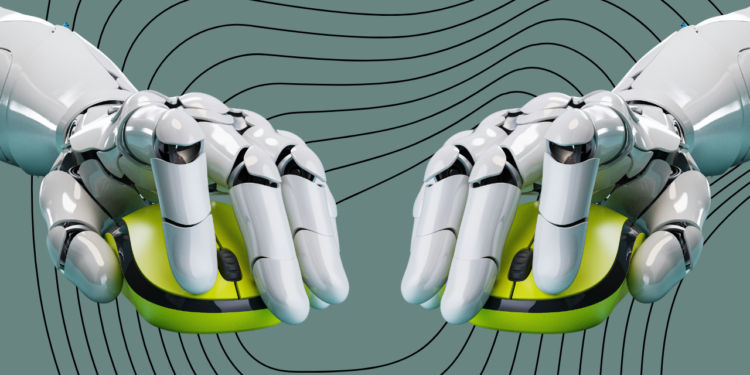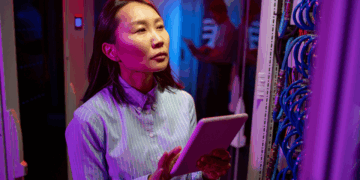- New tech enables space optimization that addresses member needs, energy use and more.
- Automate the member experience with AI-enabled offerings like chatbots and virtual assistants.
- Future-proof your space against continuing workforce changes by leveraging AI-driven solutions.
Coworking spaces have transformed the traditional workplace, offering flexibility, collaboration and cost efficiency. With the rise of artificial intelligence (AI) and automation, the coworking landscape is poised for further evolution.
As AI and automation reshape industries, coworking environments are likely to adapt in significant ways, enhancing operational efficiency, user experience and workspace functionality.
Optimized Workspace Management
AI and automation can streamline the management of coworking spaces by optimizing operations. Smart systems can manage energy use, track occupancy and adjust lighting or temperature based on user preferences.
For example, sensors combined with AI could monitor space usage in real-time, automatically reallocating underutilized areas or adjusting bookings to meet demand. These technologies help ensure that coworking spaces are used efficiently, leading to cost savings for operators and a more comfortable experience for users.
Additionally, AI-driven platforms can simplify membership management, billing and scheduling. Automation can handle routine administrative tasks such as onboarding new members, processing payments or managing inquiries, freeing up time for staff to focus on more complex, human-centered tasks.
This not only improves the efficiency of coworking space operations but also enhances customer satisfaction by reducing waiting times and errors.
Enhanced User Experience
AI-powered tools can offer personalized experiences tailored to individual coworking members. With AI, coworking spaces can create profiles based on user behavior, preferences and work habits, enabling more customized recommendations for workspace layouts, meeting room preferences or even networking opportunities.
For instance, AI could help users find the most suitable workspace by analyzing past booking patterns or suggesting colleagues with similar interests for potential collaborations.
Chatbots and virtual assistants could also enhance customer service by providing instant responses to common questions, facilitating room bookings or assisting with technical issues.
Furthermore, automation in coworking spaces can extend to smart office technologies like facial recognition for seamless access, voice-activated assistants to control lighting and devices and AI-based communication tools that streamline coordination among members.
These advancements create a smoother, more engaging coworking experience and foster a sense of community.
Changing Workforce Dynamics
The integration of AI and automation into coworking spaces mirrors broader workforce changes. As AI replaces repetitive tasks, the nature of work is shifting toward creativity, problem-solving and innovation—roles that thrive in collaborative environments like coworking spaces. This makes coworking spaces attractive for freelancers, startups and remote teams who need flexibility and access to diverse skill sets.
AI can also facilitate networking and collaboration opportunities within coworking communities.
By analyzing members’ skills, interests and project needs, AI platforms can suggest potential partnerships, fostering collaboration and creating business opportunities that may not have emerged otherwise.
AI platforms can suggest potential partnerships, fostering collaboration and creating business opportunities that may not have emerged otherwise.
This kind of intelligent matchmaking aligns well with the core purpose of coworking spaces: to encourage innovation and connection among members.
Future-Ready Spaces
AI and automation will also be critical in making coworking spaces future-ready. With the potential to support hybrid work models, AI can ensure that remote and in-office teams work seamlessly together.
AI tools like virtual reality (VR) platforms or augmented reality (AR) meeting spaces will enable teams to collaborate effectively, even across distances, making coworking spaces ideal hubs for this future workforce.
As companies increasingly adopt AI-driven processes and automation, coworking spaces can position themselves as essential environments for the new digital economy.
They can provide not just physical infrastructure but also access to AI-driven resources, tools and expertise, helping businesses and individuals stay competitive in a rapidly evolving work landscape.
Conclusion
AI and automation are set to revolutionize coworking spaces, making them smarter, more efficient and better suited to the evolving needs of modern workers.
By enhancing workspace management, user experience and collaboration opportunities, AI will help coworking spaces remain attractive in an increasingly digital and automated world. As technology continues to advance, the future of coworking will be defined by its ability to adapt and integrate these innovations, making it a central hub for the workforce of tomorrow.
Are you ready to embrace AI in your location? The Yardi Kube team can help you leverage this new technology.


 Dr. Gleb Tsipursky – The Office Whisperer
Dr. Gleb Tsipursky – The Office Whisperer Nirit Cohen – WorkFutures
Nirit Cohen – WorkFutures Angela Howard – Culture Expert
Angela Howard – Culture Expert Drew Jones – Design & Innovation
Drew Jones – Design & Innovation Jonathan Price – CRE & Flex Expert
Jonathan Price – CRE & Flex Expert












